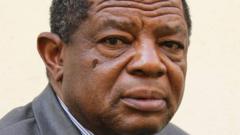Zimbabwe's political landscape is shaken as Blessed "Bombshell" Geza challenges President Mnangagwa's authority, triggering a purge within the ruling party. Despite his accusations of corruption and calls for change, experts suggest public interest has waned in confrontation.
Succession Crisis in Zimbabwe: The Rise and Fallout of ‘Bombshell’ Geza

Succession Crisis in Zimbabwe: The Rise and Fallout of ‘Bombshell’ Geza
The recent uproar within Zimbabwe's ruling Zanu-PF party sees Blessed "Bombshell" Geza vocalizing his discontent with President Mnangagwa's leadership, leading to political turmoil and concerns of a power struggle.
A wave of unease swept through Harare as armoured personnel carriers traversed a neighborhood, igniting cries of a potential military coup. However, government spokesman Nick Mangwana swiftly dismissed these fears, attributing the tanks' presence to a scheduled military exercise. This incident, nonetheless, has ignited discussions surrounding the political climate in Zimbabwe.
In recent days, President Emmerson Mnangagwa has faced unprecedented criticism from within his Zanu-PF party, with calls for his resignation echoing through party ranks. These sentiments stirred memories of the circumstances that led to the abrupt ousting of Robert Mugabe, whose rule lasted nearly four decades.
At the heart of the controversy lies Blessed Geza, known as "Bombshell," a war veteran and powerful Zanu-PF member. Geza lashed out against Mnangagwa, particularly regarding attempts to amend laws to permit the president a third term. In a series of fiery public addresses, he indicated his regret for supporting Mnangagwa’s rise to power, accusing him of prioritizing familial interests and corruption over the people's welfare.
This fervent denunciation led to Geza's expulsion from Zanu-PF, prompting him to retreat into hiding while still issuing provocative statements through social media. He is now wanted by authorities on multiple charges, including undermining the president's authority. His vocal dissent has coincided with the arrest of Blessed Mhlanga, the journalist who interviewed him, further escalating tensions among those who oppose the administration.
Mnangagwa is nearing the end of his second and final term, yet rumors among his faction highlight a desire from some supporters to extend his tenure beyond constitutional limitations, citing a need to complete his "Agenda 2030." Despite this expectation, recent pronouncements from religious leaders warn against the 2030 debate, urging focus on pressing issues such as rampant unemployment and rampant corruption.
Analysts suggest Geza's rebellion might have limited mobilizing power, lacking the fervor seen in previous political upheavals. While Geza’s statements about corruption resonate, political analyst Takura Zhangazha believes the current Zimbabwean populace is skeptical and less inclined to engage in Zanu-PF's internal conflicts. The citizens, having previously supported the military coup that led to Mugabe’s downfall, are disillusioned with the governance failures that ensued, and many now appear uninterested in repeating past demonstrations.
The Zanu-PF fiasco has also revealed fractures within the party, as various factions propose differing visions for Zimbabwe’s future. While some align with Geza’s criticisms, others support Mnangagwa, creating a fragmented political environment. Despite the apparent division, the opposition remains weak, and many Zimbabweans continue to grapple with a deteriorating economy, limiting their capacity for political mobilization.
For figures like Jameson Timba from the Citizens Coalition for Change, the dire economic conditions illuminate the failures of the current leadership. The calls for early elections seem distant as the political struggle continues, with Geza entrenched in silence and Mnangagwa secure in his position—at least for now. As discussions of succession unfold, the nation watches cautiously, uncertain of what lies ahead in Zimbabwe's tumultuous political landscape.




















